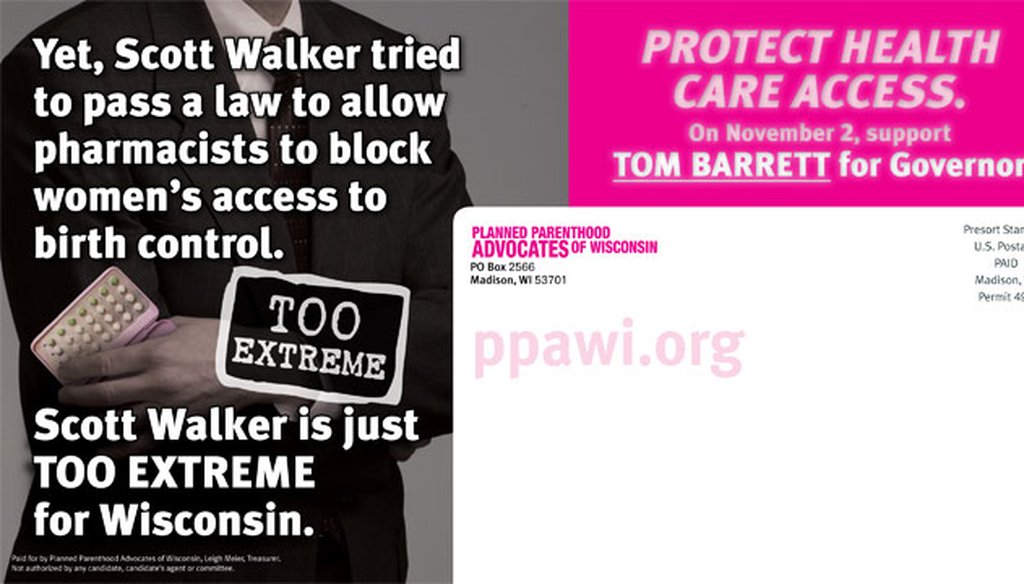



A direct mail piece from Planned Parenthood Advocates of Wisconsin against gubernatorial candidate Scott Walker
Planned Parenthood Advocates, the lobbying and political action arm of Planned Parenthood of Wisconsin, says it made more than 1.1 million "voter contacts" in the 2008 elections.
The Madison-based group, which supports pro-choice candidates, has also been working to influence voters in 2010 -- including pushing them to support Democrat Tom Barrett in the Nov. 2, 2010 election for governor.
The group is painting Barrett’s rival, GOP nominee Scott Walker, as "just too extreme." In a flier mailed to voters, it frames Walker’s views this way:
"Scott Walker tried to pass a law to allow pharmacists to block women’s access to birth control."
Is that really the case?
Planned Parenthood Advocates spokeswoman Amanda Harrington said her organization’s statement about Walker is based on Assembly Bill 168, a measure Walker sponsored in 2001 while serving in the state Assembly. It would have applied to pharmacists and other health care providers, but it did not become law.
The bill would have:
Asked to respond to the Planned Parenthood Advocates flier, Jill Bader, spokeswoman for Walker’s gubernatorial campaign, said it was "completely false" that the bill had anything to do with birth control.
But news stories at the time described how Walker’s bill targeted RU-486, an abortion pill, and the "morning-after" pill, which prevents a pregnancy. The articles also told how the proposal could have allowed pharmacists to refuse to dispense most other forms of birth control.
"Could" and "most" are the operative words.
But both Harrington and Matt Sande of Pro-Life Wisconsin say the protections for pharmacists in Walker’s bill would have applied to the dispensing of all types of birth control.
Back to the claim about Walker.
The claim does not address pills or devices, but rather how pharmacists would have been allowed to function had the bill become law.
Planned Parenthood says flatly: Pharmacists would have been able to block women from getting birth control.
In truth, the effects would have been more limited.
An individual pharmacist could have refused to fill a particular birth control prescription. But women could have gotten the prescription filled by another pharmacist, perhaps at the same counter, or at another pharmacy. In many places, that might have amounted to an inconvenience, though in areas with few pharmacies, a refusal by one pharmacist could have created a bigger burden.
As for the 2010 race, both candidates have given their views on the issue: Barrett says he opposes efforts to allow pharmacists to refuse to fill birth control prescriptions; Walker says he supports allowing pharmacists to refuse to fill emergency contraception prescriptions on moral grounds.
The claim by Planned Parenthood is still off the mark.
In an effort to paint Walker as extreme, the group’s lobbying arm says in a direct mail piece that Walker "tried to pass a law to allow pharmacists to block women’s access to birth control." That bill might have made it more difficult for some women to get contraceptives at some pharmacies, depending on who was on duty. But words matter -- the possible narrowing of access to birth control in some cases isn’t the same as blocking it in all cases.
We rate the claim as Barely True.
E-mail interview with Scott Walker for governor campaign spokeswoman Jill Bader, Oct. 12, 2010
Interview with Pro-Life Wisconsin Director of Legislative Affairs Matt Sande, Oct. 12, 2010
Interviews with Planned Parenthood Advocates of Wisconsin spokeswoman Amanda Harrington, Oct. 11 and 13, 2010
Mayo Clinic, "morning-after pill" definition
Mayo Clinic, medical abortion (RU-486)
Milwaukee Journal Sentinel, Panel backs bill on ethics, medical duties, by Associated Press, April 19, 2001
Milwaukee Journal Sentinel, When health care, morality collide, April 12, 2001
Milwaukee Journal Sentinel, Abortion, birth control are wedge issues in governor's race, Oct. 2, 2010
Planned Parenthood Advocates of Wisconsin, Barrett endorsement news release, June 7, 2010
Planned Parenthood Advocates of Wisconsin, flier
Wisconsin Democracy Campaign, Planned Parenthood Advocates of WI Election Fund (PPAWI PAC)
Wisconsin Government Accountability Board, Organizations employing lobbyists in 2009-2010
Wisconsin Legislature, History of Assembly Bill 168
In a world of wild talk and fake news, help us stand up for the facts.
